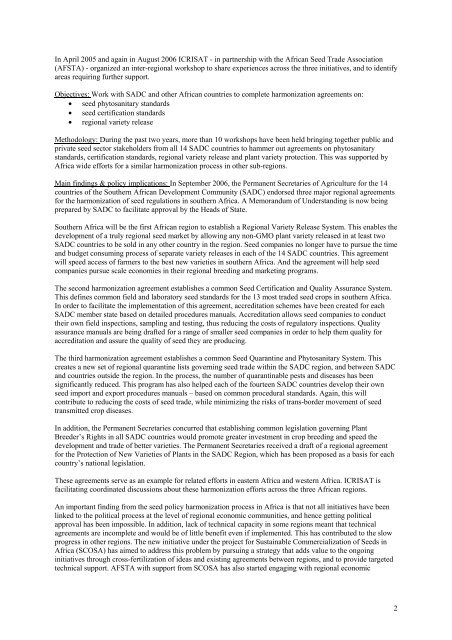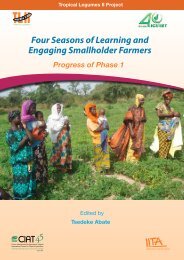ICRISAT Archival Report 2006 - The seedlings of success in the ...
ICRISAT Archival Report 2006 - The seedlings of success in the ...
ICRISAT Archival Report 2006 - The seedlings of success in the ...
Create successful ePaper yourself
Turn your PDF publications into a flip-book with our unique Google optimized e-Paper software.
In April 2005 and aga<strong>in</strong> <strong>in</strong> August <strong>2006</strong> <strong>ICRISAT</strong> - <strong>in</strong> partnership with <strong>the</strong> African Seed Trade Association<br />
(AFSTA) - organized an <strong>in</strong>ter-regional workshop to share experiences across <strong>the</strong> three <strong>in</strong>itiatives, and to identify<br />
areas requir<strong>in</strong>g fur<strong>the</strong>r support.<br />
Objectives: Work with SADC and o<strong>the</strong>r African countries to complete harmonization agreements on:<br />
• seed phytosanitary standards<br />
• seed certification standards<br />
• regional variety release<br />
Methodology: Dur<strong>in</strong>g <strong>the</strong> past two years, more than 10 workshops have been held br<strong>in</strong>g<strong>in</strong>g toge<strong>the</strong>r public and<br />
private seed sector stakeholders from all 14 SADC countries to hammer out agreements on phytosanitary<br />
standards, certification standards, regional variety release and plant variety protection. This was supported by<br />
Africa wide efforts for a similar harmonization process <strong>in</strong> o<strong>the</strong>r sub-regions.<br />
Ma<strong>in</strong> f<strong>in</strong>d<strong>in</strong>gs & policy implications: In September <strong>2006</strong>, <strong>the</strong> Permanent Secretaries <strong>of</strong> Agriculture for <strong>the</strong> 14<br />
countries <strong>of</strong> <strong>the</strong> Sou<strong>the</strong>rn African Development Community (SADC) endorsed three major regional agreements<br />
for <strong>the</strong> harmonization <strong>of</strong> seed regulations <strong>in</strong> sou<strong>the</strong>rn Africa. A Memorandum <strong>of</strong> Understand<strong>in</strong>g is now be<strong>in</strong>g<br />
prepared by SADC to facilitate approval by <strong>the</strong> Heads <strong>of</strong> State.<br />
Sou<strong>the</strong>rn Africa will be <strong>the</strong> first African region to establish a Regional Variety Release System. This enables <strong>the</strong><br />
development <strong>of</strong> a truly regional seed market by allow<strong>in</strong>g any non-GMO plant variety released <strong>in</strong> at least two<br />
SADC countries to be sold <strong>in</strong> any o<strong>the</strong>r country <strong>in</strong> <strong>the</strong> region. Seed companies no longer have to pursue <strong>the</strong> time<br />
and budget consum<strong>in</strong>g process <strong>of</strong> separate variety releases <strong>in</strong> each <strong>of</strong> <strong>the</strong> 14 SADC countries. This agreement<br />
will speed access <strong>of</strong> farmers to <strong>the</strong> best new varieties <strong>in</strong> sou<strong>the</strong>rn Africa. And <strong>the</strong> agreement will help seed<br />
companies pursue scale economies <strong>in</strong> <strong>the</strong>ir regional breed<strong>in</strong>g and market<strong>in</strong>g programs.<br />
<strong>The</strong> second harmonization agreement establishes a common Seed Certification and Quality Assurance System.<br />
This def<strong>in</strong>es common field and laboratory seed standards for <strong>the</strong> 13 most traded seed crops <strong>in</strong> sou<strong>the</strong>rn Africa.<br />
In order to facilitate <strong>the</strong> implementation <strong>of</strong> this agreement, accreditation schemes have been created for each<br />
SADC member state based on detailed procedures manuals. Accreditation allows seed companies to conduct<br />
<strong>the</strong>ir own field <strong>in</strong>spections, sampl<strong>in</strong>g and test<strong>in</strong>g, thus reduc<strong>in</strong>g <strong>the</strong> costs <strong>of</strong> regulatory <strong>in</strong>spections. Quality<br />
assurance manuals are be<strong>in</strong>g drafted for a range <strong>of</strong> smaller seed companies <strong>in</strong> order to help <strong>the</strong>m quality for<br />
accreditation and assure <strong>the</strong> quality <strong>of</strong> seed <strong>the</strong>y are produc<strong>in</strong>g.<br />
<strong>The</strong> third harmonization agreement establishes a common Seed Quarant<strong>in</strong>e and Phytosanitary System. This<br />
creates a new set <strong>of</strong> regional quarant<strong>in</strong>e lists govern<strong>in</strong>g seed trade with<strong>in</strong> <strong>the</strong> SADC region, and between SADC<br />
and countries outside <strong>the</strong> region. In <strong>the</strong> process, <strong>the</strong> number <strong>of</strong> quarant<strong>in</strong>able pests and diseases has been<br />
significantly reduced. This program has also helped each <strong>of</strong> <strong>the</strong> fourteen SADC countries develop <strong>the</strong>ir own<br />
seed import and export procedures manuals – based on common procedural standards. Aga<strong>in</strong>, this will<br />
contribute to reduc<strong>in</strong>g <strong>the</strong> costs <strong>of</strong> seed trade, while m<strong>in</strong>imiz<strong>in</strong>g <strong>the</strong> risks <strong>of</strong> trans-border movement <strong>of</strong> seed<br />
transmitted crop diseases.<br />
In addition, <strong>the</strong> Permanent Secretaries concurred that establish<strong>in</strong>g common legislation govern<strong>in</strong>g Plant<br />
Breeder’s Rights <strong>in</strong> all SADC countries would promote greater <strong>in</strong>vestment <strong>in</strong> crop breed<strong>in</strong>g and speed <strong>the</strong><br />
development and trade <strong>of</strong> better varieties. <strong>The</strong> Permanent Secretaries received a draft <strong>of</strong> a regional agreement<br />
for <strong>the</strong> Protection <strong>of</strong> New Varieties <strong>of</strong> Plants <strong>in</strong> <strong>the</strong> SADC Region, which has been proposed as a basis for each<br />
country’s national legislation.<br />
<strong>The</strong>se agreements serve as an example for related efforts <strong>in</strong> eastern Africa and western Africa. <strong>ICRISAT</strong> is<br />
facilitat<strong>in</strong>g coord<strong>in</strong>ated discussions about <strong>the</strong>se harmonization efforts across <strong>the</strong> three African regions.<br />
An important f<strong>in</strong>d<strong>in</strong>g from <strong>the</strong> seed policy harmonization process <strong>in</strong> Africa is that not all <strong>in</strong>itiatives have been<br />
l<strong>in</strong>ked to <strong>the</strong> political process at <strong>the</strong> level <strong>of</strong> regional economic communities, and hence gett<strong>in</strong>g political<br />
approval has been impossible. In addition, lack <strong>of</strong> technical capacity <strong>in</strong> some regions meant that technical<br />
agreements are <strong>in</strong>complete and would be <strong>of</strong> little benefit even if implemented. This has contributed to <strong>the</strong> slow<br />
progress <strong>in</strong> o<strong>the</strong>r regions. <strong>The</strong> new <strong>in</strong>itiative under <strong>the</strong> project for Susta<strong>in</strong>able Commercialization <strong>of</strong> Seeds <strong>in</strong><br />
Africa (SCOSA) has aimed to address this problem by pursu<strong>in</strong>g a strategy that adds value to <strong>the</strong> ongo<strong>in</strong>g<br />
<strong>in</strong>itiatives through cross-fertilization <strong>of</strong> ideas and exist<strong>in</strong>g agreements between regions, and to provide targeted<br />
technical support. AFSTA with support from SCOSA has also started engag<strong>in</strong>g with regional economic<br />
2

















